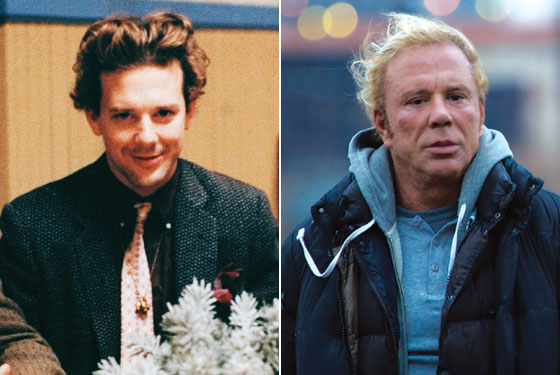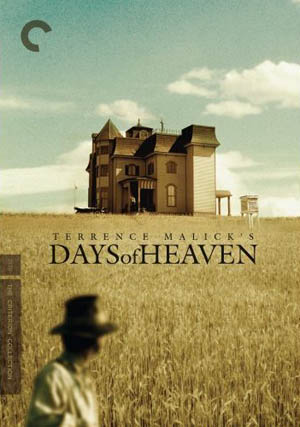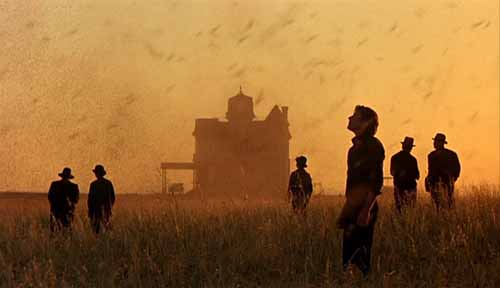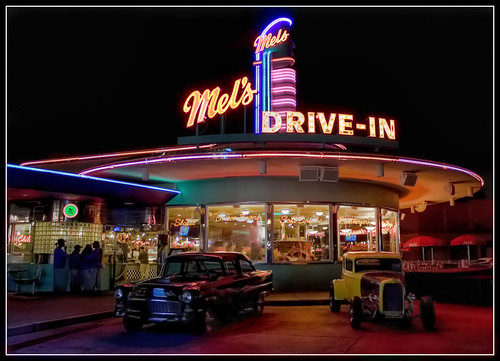

Micky says....
This film is opens on Christmas night 1959 and ends on New Years Eve, which is exactly the holidays when we chose to watch it (except in 2009/10, obviously...). It has a pretty all-star cast, as you can see on the poster above, but at the time it was made these actors were all unknowns. And the acting is pretty great, which is probably a big reason why many of them went on to success.
The film is OK, more enjoyable than the recently viewed Bull Durham, but again not anything to get too excited about. A group of six 20 something guys in Baltimore hang out at a Diner a whole bunch, and one of their number is getting married on New Year's Eve - given that she passes a 'football quiz' given to her by her husband beforehand. The diner itself is awesome, and right now I have a big craving for chips with gravy, the meal of choice quite often for them. Seeing all those delicous gravy-doused chips makes you realise just how much more aware we are these days of the food we choose to eat. But I ask, why does it have to taste so good if it is so bad for you? So unfair.
 There is pretty much a different plot going on for each of the characters, often focused on the ideas and anxieties associated with 'settling down', getting married or getting a steady job, though not all plots are fully resolved. Kevin Bacon's character Fenwick is at the start a bit of a cheeky roustabout, and I don't really remember much of a plot progression for him, though we see less of his antics as the film goes on. There are definitely some classic moments, such as Boogie's (Mickey Rourke) penis in a box of popcorn, and the whole idea of the football quiz that Eddie (Steve Guttenberg) forces upon his future wife and the fact that she must achieve at least 65 points for the marriage to go ahead. I got a bit lost sometimes with all the characters and their unique nuances, and I don't think many of the main characters are fully able to develop within the time available. I think the dominant character and therefore most fully rounded is Boogie, who has several interesting moments with several different women, as well as getting into trouble with a bookie, working as a hairdresser and studying to be a lawyer. None of the other characters have quite as much depth.
There is pretty much a different plot going on for each of the characters, often focused on the ideas and anxieties associated with 'settling down', getting married or getting a steady job, though not all plots are fully resolved. Kevin Bacon's character Fenwick is at the start a bit of a cheeky roustabout, and I don't really remember much of a plot progression for him, though we see less of his antics as the film goes on. There are definitely some classic moments, such as Boogie's (Mickey Rourke) penis in a box of popcorn, and the whole idea of the football quiz that Eddie (Steve Guttenberg) forces upon his future wife and the fact that she must achieve at least 65 points for the marriage to go ahead. I got a bit lost sometimes with all the characters and their unique nuances, and I don't think many of the main characters are fully able to develop within the time available. I think the dominant character and therefore most fully rounded is Boogie, who has several interesting moments with several different women, as well as getting into trouble with a bookie, working as a hairdresser and studying to be a lawyer. None of the other characters have quite as much depth.This is an OK to pretty good film, though perhaps not as deserving of the two page spread it has attained in '1001 Movies You Must See Before You Die' as something else (most films receive only 1/2 or one full page in the book so when they get a two pager you hope it'll be a gooden!). However having now written about it, I do think it was worthwhile viewing, if only for the great diner, the swing dancing, and great performances.

Ads says...
Yo, Mickey Rourke - what happened to your face? I think I've realised why I didn't engage with this film quite as much as whoever chose to put it in '1001 Movies You Must See Before You Die', and its because for me there were too many characters - although we were given glimpses into all of their lives, many of them just came off as archetypes in search of detail. Whilst the performances were uniformly good, some characters were more developed than others merely because they were given more screen time. You had the pretty boy/ladies man (Mickey Rourke), the rascally rapscallion (Kevin Bacon), the married guy who mourns his independence (Daniel Stern), the cocky young buck about to be wed - on his own terms (Steve Guttenberg in a surprisingly not shit performance), the guy who's moved away (Tim Daly) and the funny guy (Paul Riser).
Of all these characters, we only really get to know two or three particularly well. Rourke is undoubtedly the star of the film - he's the ladies man with two or three broads on the go at one time - and he's great in this, proving just how much charisma and ability he had as a young actor (before his face melted). His scenes with Ellen Barkin are fantastic - and she's great too. In fact, I think we get know her character better than a lot of the other dudes. Take Paul Riser for example - he's really just there to crack jokes. We learn nothing about him except for the splashes of intellect he displays when rattling off observational comedy bits or asking Daniel Stern for a lift by not asking him - actually he kind of just comes across as 'neurotic Jewish guy', which is a bit problematic and a waste. I also wanted more insight into Tim Daly's character - the guy who'd moved away but still had a girlfriend back home - but the other characters were all so obsessed about their own lives that he never had the opportunity to really tell us what was going on for him, so instead we get some awkward moments between him and his girlfriend talking "around" their problems and never really getting to the crux of what's going on. I guess that's meant to represent the fact that she just doesn't want a long-distance relationship anymore, but it was handled in a pretty obtuse manner that, although I get it, didn't quite work.
Having said all this, Diner certainly wasn't a bad film - there are some great performances and some good laughs to be had. The production design was interesting in that it didn't overstate the nostalgic elements of the whole "Hey there baby boomers - remember when we were young - back in the 50s!" vibe, and I guess by setting it in Baltimore you're given less iconic backdrops upon which the play up the nostalgic elements, which I actually appreciated - because it's set during the middle of winter and mostly at night it's actually quite a dark film visually. Overall though, I almost wish they'd either extended the running time to include more detail about each character, or trimmed a couple of them and focussed on a few.












